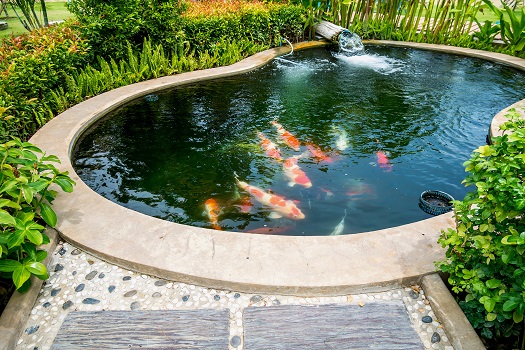- Your shopping cart is empty!
How to Ensure Your Koi Pond Is Properly Filtered

Following a tough day at work, it’s relaxing to come home and watch the koi swim in your pond. Occasionally, you may find yourself squinting while trying to view your fish. When your pond looks clouded and sludgy, your fish will fail to thrive, which means you need one of the most important koi pond supplies: a better filtration system. Here are a few tips on keeping your koi pond properly filtered.
Get the Right Filter to Keep the Pond Clean
Koi, like any other living creature, produce waste products. Because they live, breathe, eat, excrete waste, and swim in the same environment, filters provide a way to eliminate waste and keep a flow of healthy, clean water moving throughout your pond. Filters usually consist of a mechanical system and a biological filtration design. You can purchase an automatic mechanical system to cut down on your portion of the maintenance routine. Mechanical filters are an essential factor in cleaning debris and solids from your water. However, clear sparkling pond water doesn’t necessarily mean your pond is healthy.
Reduce Ammonia in the Water
When koi produce waste, ammonia starts to build in the water. If you overfeed your fish, excess food collects in the pond and combines with fish waste to produce harmful toxins. Other organic matter, such as an excessive amount of dead leaves, adds to the problem. Many methods exist to convert ammonia and other toxins into nitrates, which plants absorb. Nitrate is usually benign, but not at high levels. An ammonia test kit and nitrate test kit are the two most important monitors you can get for understanding the water conditions of your pond. Don’t forget to add a regimen of beneficial bacteria to your pond on a quarterly basis, as it boosts the essential biological filtration to maintain healthy koi.
Calculate the Correct Filtration Needed
A good rule of thumb is to get a filter that can process twice the amount of water in your pond. If your pond holds 2,500 gallons of water, your filter needs to have a 5,000-gallon processing capacity. Remember that koi grow, mature, and reproduce. Proper pond filtration takes these factors into consideration. Another consideration is the number of fish you put in your pond and how much they are being fed. A good rule is allotting one gallon of water to one inch of koi. Allow room for baby koi that inevitably come along with a healthy pond.
Keep the Water Moving
Stagnant, still water seldom has fish living in it. Fish depend on oxygenated water to breathe. A filter that produces continuously moving water in some form is essential for healthy koi. Passive strainers are not enough. A filter that produces bubbles in any form is good for your koi. The healthy bacteria need a steady oxygen supply to continually process toxins out of the pond. Plants are a good source of oxygen, and they also provide a cool place for koi to hide during the heat of the day. Never put your pump on a timer because biological filtration needs oxygen 24 hours a day.
Drain the Waste
Your filter needs some help removing the solids that build up in a pond. Cleaning your filters and doing a partial (10 percent) water change is the most important maintenance you can do for your pond and fish, and it’s also probably the most misunderstood. Some people incorrectly think adding water to replace evaporation is the same as doing a water change. However, this isn’t the case. Only pure H2O is evaporated, and the dissolved organics just intensify with time. Take some water out of your pond and water your garden with it. Pond water is full of nitrate that is beneficial for your plants, not your fish. When you create your pond, put a good drainage system in it. Aquatic Warehouse, a trusted pond and aquarium supplier, is a great source of help and supplies to install the right drain and filtration system.
Koi thrive in the right environment. Once you have the top-of-the-line koi pond filters needed to keep your pond healthy, you can lean back and enjoy feeding and watching your koi. If you have any questions regarding pond filtration, contact the pond and aquarium experts at Aquatic Warehouse at 858-467-9297.
